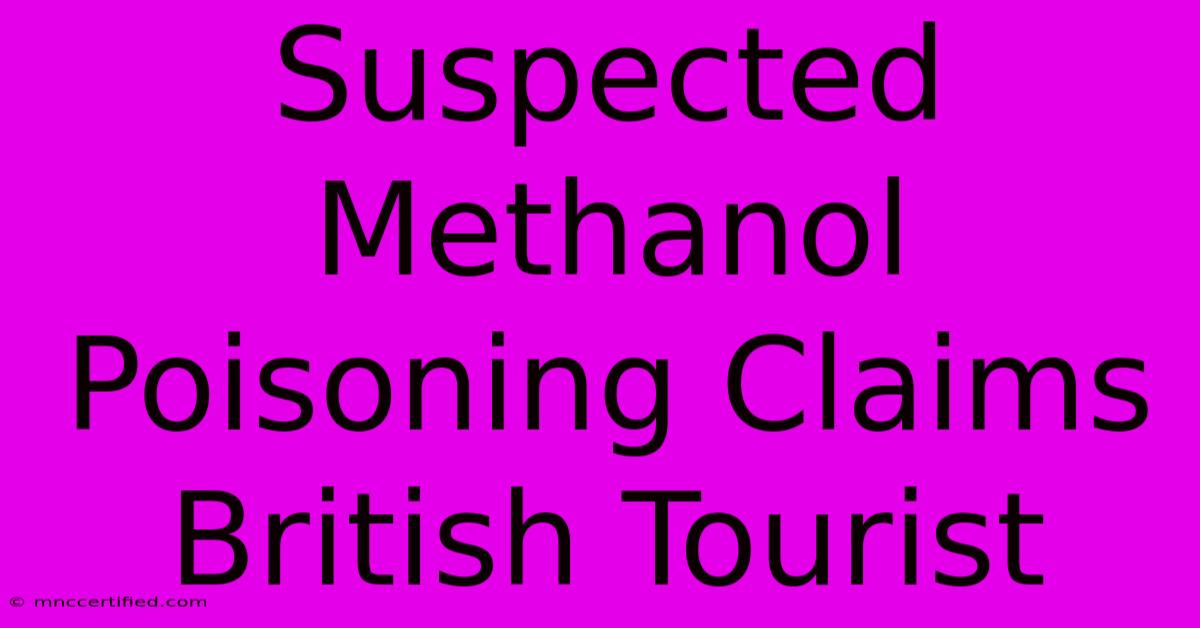Suspected Methanol Poisoning Claims British Tourist

Table of Contents
Suspected Methanol Poisoning Claims British Tourist: A Detailed Look at the Incident and its Implications
A recent incident involving a British tourist suffering from suspected methanol poisoning has raised serious concerns about the safety of alcoholic beverages, particularly in tourist destinations. This article delves into the details of this case, exploring the potential causes, symptoms, treatment, and broader implications for both travelers and the hospitality industry. We will examine the importance of responsible alcohol consumption and the crucial role of regulatory bodies in ensuring public safety.
The Case of the British Tourist
Reports indicate a British tourist, whose identity has not yet been publicly released for privacy reasons, experienced severe symptoms consistent with methanol poisoning after consuming alcohol during their vacation. The exact location of the incident remains undisclosed to protect the individual's privacy, but investigations are underway. The severity of the symptoms necessitated urgent medical attention, highlighting the potentially life-threatening nature of methanol poisoning.
Symptoms of Methanol Poisoning
Methanol poisoning presents a range of symptoms, varying in severity depending on the amount ingested. Early symptoms can be subtle and easily mistaken for other conditions, including:
- Headache: A persistent and often severe headache is a common early sign.
- Nausea and Vomiting: Gastrointestinal distress is frequently experienced.
- Blurred Vision: Visual impairment can range from mild blurring to complete blindness.
- Dizziness and Confusion: Mental confusion and disorientation are also possible.
More severe cases can lead to:
- Metabolic Acidosis: A dangerous imbalance in the body's acid-base balance.
- Seizures: Uncontrolled electrical activity in the brain.
- Respiratory Failure: Inability to breathe adequately.
- Death: In extreme cases, methanol poisoning can be fatal.
It is crucial to seek immediate medical attention if any of these symptoms appear after alcohol consumption.
The Dangers of Methanol
Methanol, also known as methyl alcohol or wood alcohol, is a highly toxic substance. Unlike ethanol (the type of alcohol found in alcoholic beverages), methanol is metabolized by the body into formaldehyde and formic acid, which are extremely damaging to the body's tissues and organs, particularly the eyes, kidneys, and nervous system.
Sources of Methanol Contamination
Methanol contamination in alcoholic beverages can occur through several avenues:
- Adulterated Alcohol: Unscrupulous producers may add methanol to increase the volume and reduce production costs. This is particularly prevalent in unregulated or counterfeit alcohol markets.
- Improper Distillation: Insufficiently purified alcohol during the distillation process can leave residual methanol.
- Contaminated Raw Materials: Contamination of the raw materials used in alcohol production can also lead to methanol presence.
Prevention and Public Health Measures
Preventing methanol poisoning requires a multi-pronged approach:
- Responsible Alcohol Consumption: Always drink responsibly and choose reputable brands of alcohol. Avoid consuming alcohol from unknown or unreliable sources.
- Stronger Regulations: Governments and regulatory bodies need to implement and enforce stricter regulations on alcohol production and distribution, ensuring rigorous quality control and testing. This includes cracking down on the production and sale of counterfeit alcohol.
- Consumer Awareness: Public health campaigns are essential to raise awareness about the dangers of methanol poisoning and educate consumers on how to identify and avoid contaminated alcohol.
- Tourist Safety: Travel advisories and information provided by tour operators should include warnings about consuming alcohol from untrusted sources, particularly in areas with less stringent regulations.
Conclusion: Protecting Tourists and Public Health
The suspected methanol poisoning case involving the British tourist serves as a stark reminder of the potential dangers lurking in the alcohol industry. Addressing this issue demands collective effort from consumers, producers, regulators, and public health organizations. Increased awareness, stringent regulations, and responsible consumption habits are crucial to mitigating the risk of methanol poisoning and ensuring the safety of both tourists and the general public. The ongoing investigation into this incident is crucial for determining the exact source of the contamination and preventing similar tragedies in the future.

Thank you for visiting our website wich cover about Suspected Methanol Poisoning Claims British Tourist. We hope the information provided has been useful to you. Feel free to contact us if you have any questions or need further assistance. See you next time and dont miss to bookmark.
Featured Posts
-
Colorado Lands Julian Lewis Profile
Nov 22, 2024
-
No Ag Nomination For Gaetz
Nov 22, 2024
-
Mens Swimming Princeton Vs Penn And Cornell
Nov 22, 2024
-
Morgan On Ellens Show Cancellation
Nov 22, 2024
-
Cnbc India Adanis Us Fraud Accusations
Nov 22, 2024